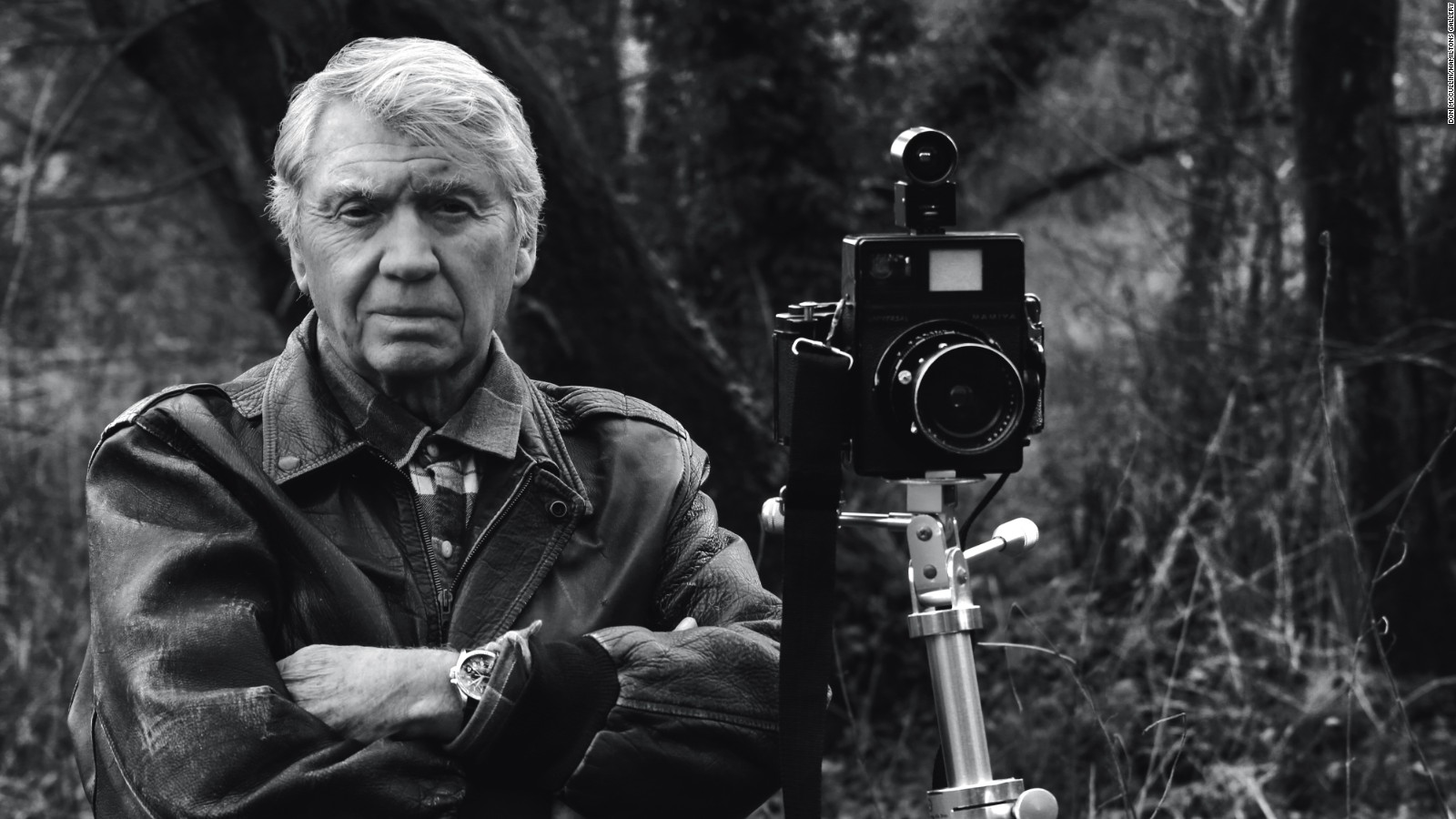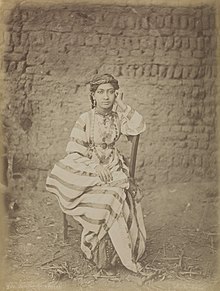
About

Don McCullin
Jump to navigation Jump to search
|
Don McCullin
|
|
|---|---|

McCullin on TV Brasil, 2011
|
|
| Born |
Donald McCullin
9 October 1935 |
| Nationality | British |
| Occupation | Photojournalist |
| Years active | 1959–present |
| Children | 5 |
Sir Donald McCullin, CBE, Hon FRPS (born 9 October 1935), is a British photojournalist, particularly recognized for his war photography and images of urban strife. His career, which began in 1959, has specialised in examining the underside of society, and his photographs have depicted the unemployed, downtrodden and the impoverished.
السير دونالد ماكولين ، CBE ، Hon FRPS (من مواليد 9 أكتوبر 1935) ، هو مصور صحفي
بريطاني ، معترف به بشكل خاص لتصويره الحرب وصور الصراع في المناطق الحضرية.
تخصصت حياته المهنية ، التي بدأت في عام 1959 ، في دراسة الجانب السفلي من
المجتمع ، وصورت صوره العاطلين عن العمل والمضطهدين والفقراء.
Early life
McCullin grew up in Finsbury Park, North London, but he was evacuated to a farm in Somerset during the Blitz.[1] He is slightly dyslexic[2][3] but displayed a talent for drawing at the Secondary Modern School he attended. He won a scholarship to Hammersmith School of Arts and Crafts[3] but, following the death of his father, he left school at the age of 15, without qualifications, for a catering job on the railways.[2][3] He was then called up for National Service with the Royal Air Force (RAF) in 1953.[4]
Photojournalism
During McCullin’s period of National Service in the RAF he was posted to the Canal Zone during the 1956 Suez Crisis, where he worked as a photographer’s assistant. He failed the written theory paper to become a photographer in the RAF and spent his service in the darkroom.[5][4] During this period McCullin bought his first camera, a Rolleicord for £30 when stationed in Nairobi, Kenya.[6] On return to Britain, shortage of funds led to his pawning the camera and his mother used her money to redeem the pledge.[7]
In 1958 he took a photograph of a local London gang posing in a bombed out building. He was persuaded by his colleagues to take his photograph of The Guvnors, as the gang was known, to The Observer, who published it, setting him on his path as a photographer.[6][8] Between 1966 and 1984, he worked as an overseas correspondent for the Sunday Times Magazine, recording ecological and man-made catastrophes such as wars, amongst them Biafra in 1968, and victims of the African AIDS epidemic.[4] His hard-hitting coverage of the Vietnam War and the Northern Ireland conflict is particularly highly regarded.
He also took the photographs of Maryon Park in London which were used in Michelangelo Antonioni‘s film Blowup,[9] In 1968, his Nikon camera stopped a bullet intended for him.[10] Also in 1968, on 28 July, he was invited to photograph the Beatles, then at the height of their fame and in the midst of recording The White Album. These sessions, made at several London locations, have become known as The Mad Day Out. They contain many well known images of the band, including the gatefold sleeve picture from the Red and Blue compilations, where the Beatles mingled with the crowd seen through railings. The photographs from this day were published in the 2010 book A Day in the Life of the Beatles.
In 1982 the British Government refused to grant McCullin a press pass to cover the Falklands War, claiming the boat was full.[11][12][13][14][15] At the time he believed it was because the Thatcher government felt his images might be too disturbing politically.
He is the author of a number of books, including The Palestinians (with Jonathan Dimbleby, 1980), Beirut: A City in Crisis (1983) and Don McCullin in Africa (2005). His book, Shaped by War (2010) was published to accompany a retrospective exhibition at the Imperial War Museum North, Salford, England in 2010 and then at the Victoria Art Gallery, Bath and the Imperial War Museum, London. His most recent publication is Southern Frontiers: A Journey Across the Roman Empire, a poetic and contemplative study of selected Roman and pre-Roman ruins in North Africa and the Middle East.
In 2012, a documentary film of his life titled McCullin and directed by David Morris and Jacqui Morris was released. The film was nominated for two BAFTA awards.[16] In later years, McCullin has turned to landscape, still-life works and commissioned portraits. In November 2015 McCullin was named the Photo London Master of Photography for 2016, at the launch of Photo London, an art fair due to open at Somerset House in May 2016. A special exhibition dedicated to his work is to be commissioned. When asked about the rise of digital photography, he said: “Digital photography can be a totally lying experience – you can move what you want, the whole thing can’t be trusted really”.[17]
Filmed in February 2018 and broadcast the following May, the BBC Four documentary The Road To Palmyra[18] saw McCullin visit Syria with historian Dan Cruickshank to see the devastation left by the conflict on the UNESCO listed site of Palmyra. Discussing his trip with the Radio Times he spoke of his approach to entering war zones: “I have risked my life endless times, and ended up in hospital with all kinds of burns and shell wounds. I have those reptile eyes that see behind and in front of me. I’m constantly trying to stay alive. I’m aware of warfare, of hidden mines.”
Despite his reputation as a war photographer, McCullin has said that Alfred Stieglitz was a key influence on his work.[6]
Personal life
Living in Somerset, he is married and has five children from his marriages.[4]
Publications
- The Destruction Business. Open Gate Books. 1971. ISBN 0-333-13022-7.
- Is Anyone Taking Any Notice?. MIT Press. 1973.
- Anton Wallich-Clifford & Don McCullin (1974). No Fixed Abode. Macmillan Publishers.
- Homecoming. Macmillan. 1979.
- Jonathan Dimbleby & Don McCullin (1980). The Palestinians. Quartet Books. ISBN 0-7043-3322-8.
- Hearts of Darkness: Photographs by Don McCullin. Secker and Warburg. 1980.
- Don McCullin. (1983). Beirut: A City in Crisis. New English Library. ISBN 0-450-06037-3.
- Don McCullin. (1987). Perspectives. Harrap. ISBN 0-245-54368-6.
- Don McCullin ; introduction by John Fowles. (1989). Open Skies. Jonathan Cape. ISBN 0-224-02539-2.
- Norman Lewis & Don McCullin (1993). An Empire of the East: Travels in Indonesia. London: Jonathan Cape. ISBN 0-224-03230-5.
- Don McCullin (1994). Sleeping with Ghosts: A Life’s Work in Photography. London: Jonathan Cape. ISBN 0-224-03241-0.
- Don McCullin (1999). India. London: Jonathan Cape. ISBN 0-224-05089-3.
- Cold Heaven. Christian Aid. 2001. ISBN 0-904379-47-7.
- Don McCullin; with Lewis Chester. (2002). Unreasonable Behaviour: An Autobiography. Vintage Books. ISBN 0-09-943776-7.
- Don McCullin (2003). Don McCullin. London: Jonathan Cape. ISBN 0-224-07118-1.
- Life Interrupted. Christian Aid. 2004. ISBN 0-904379-64-7.
- Don McCullin. (2005). Don McCullin in Africa. London: Jonathan Cape. ISBN 0-224-07514-4.
- Don McCullin (2007). Don McCullin in England. London: Jonathan Cape. ISBN 978-0-224-07870-2.
- Don McCullin (2010). Shaped by War. Vintage. ISBN 978-0-224-09026-1.
- Don McCullin (2010) A Day in the Life of the Beatles. London: Jonathan Cape. ISBN 9780224091244. New York: Rizzoli. ISBN 9780847836116.
- A day in the life of the Beatles: un giorno speciale con John, Paul, George e Ringo. Milan: Rizzoli. ISBN 9788817043793.
- A day in the life of the Beatles: söndagen den 28 juli 1968. Stockholm: Max Ström. ISBN 9789171262042.
- Don McCullin (2010). Southern Frontiers: A Journey Across the Roman Empire. London: Jonathan Cape. ISBN 978-0-224-08708-7.
- The Landscape. London: Jonathan Cape, 2018. ISBN 978-1787330429.
Awards
- 1964: World Press Photo of the Year, Amsterdam, for his coverage of the war in Cyprus.[19]
- 1964: Photo Stories, third prize stories, World Press Photo award, Amsterdam.[20]
- 1964: Warsaw Gold Medal.[21]
- 1974: News Picture, first prize stories, World Press Photo award 1973, Amsterdam.[20]
- 1977: Honorary Fellowship of the Royal Photographic Society (FRPS).[22]
- 1978: Photo Stories, first prize stories, World Press Photo award 1977, Amsterdam.[20]
- 1984: Spot News, second prize stories, World Press Photo award 1983, Amsterdam.[20]
- 1993: Honorary doctorate from the University of Bradford.[21]
- 1993: CBE, the first photojournalist to receive the honour.[23]
- 1994: Honorary degree from the Open University.[24]
- 2003: Royal Photographic Society’s Special 150th Anniversary Medal and Honorary Fellowship (HonFRPS) in recognition of a sustained, significant contribution to the art of photography.[25]
- 2006: Cornell Capa Award.[26]
- 2007: Royal Photographic Society’s Centenary Medal.[27]
- 2008: Honorary Doctorate of Letters by the University of Gloucestershire in recognition of his lifetime’s achievement in photojournalism.[28]
- 2009: Honorary Fellowship of Hereford College of Arts.[29]
- 2011: Honorary Degree (Doctor of Arts) from the University of Bath.[30]
- 2016: Lucie Award in Achievement in Photojournalism category[31]
- 2017: McCullin was knighted in the 2017 New Year Honours for services to photography.[32]
- 2017: Honorary Degree (Doctor of Letters) from the University of Exeter.[33]
Exhibitions
- 2010–2012: Shaped by War: Photographs by Don McCullin, Imperial War Museum North, Salford, UK, 2010;[34][35][36] Victoria Art Gallery, Bath, UK, 2010;[37] Imperial War Museum, London, 2011–2012[38] in an updated form.[39] A retrospective with Photographs, contact sheets, objects, magazines and personal memorabilia.
- 2013: Retrospective, National Gallery of Canada, Ottawa, Canada.[40]
- 2019: Retrospective, Tate Britain, London, UK[41]
Collections
McCullin’s work is held in the following permanent collection:
- Tate, UK: 85 prints as of May 2018[42]
- Victoria and Albert Museum, London: 11 prints[43]
Quotes
- “I grew up in total ignorance, poverty and bigotry, and this has been a burden for me throughout my life. There is still some poison that won’t go away, as much as I try to drive it out.”[44]
- “I am a professed atheist, until I find myself in serious circumstances. Then I quickly fall on my knees, in my mind if not literally, and I say : ‘Please God, save me from this.'”[44]
- “I have been manipulated, and I have in turn manipulated others, by recording their response to suffering and misery. So there is guilt in every direction: guilt because I don’t practise religion, guilt because I was able to walk away, while this man was dying of starvation or being murdered by another man with a gun. And I am tired of guilt, tired of saying to myself: “I didn’t kill that man on that photograph, I didn’t starve that child.” That’s why I want to photograph landscapes and flowers. I am sentencing myself to peace.”[44]
- “Photogra









